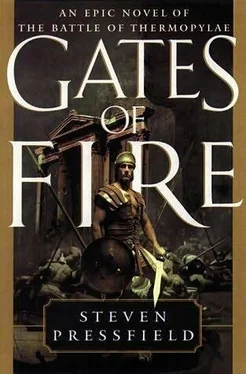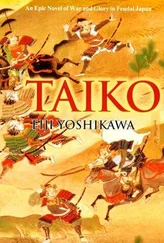Steven Pressfield - Gates of Fire - An Epic Novel of the Battle of Thermopylae
Здесь есть возможность читать онлайн «Steven Pressfield - Gates of Fire - An Epic Novel of the Battle of Thermopylae» весь текст электронной книги совершенно бесплатно (целиком полную версию без сокращений). В некоторых случаях можно слушать аудио, скачать через торрент в формате fb2 и присутствует краткое содержание. Жанр: Историческая проза, на английском языке. Описание произведения, (предисловие) а так же отзывы посетителей доступны на портале библиотеки ЛибКат.
- Название:Gates of Fire: An Epic Novel of the Battle of Thermopylae
- Автор:
- Жанр:
- Год:неизвестен
- ISBN:нет данных
- Рейтинг книги:3 / 5. Голосов: 1
-
Избранное:Добавить в избранное
- Отзывы:
-
Ваша оценка:
- 60
- 1
- 2
- 3
- 4
- 5
Gates of Fire: An Epic Novel of the Battle of Thermopylae: краткое содержание, описание и аннотация
Предлагаем к чтению аннотацию, описание, краткое содержание или предисловие (зависит от того, что написал сам автор книги «Gates of Fire: An Epic Novel of the Battle of Thermopylae»). Если вы не нашли необходимую информацию о книге — напишите в комментариях, мы постараемся отыскать её.
Gates of Fire: An Epic Novel of the Battle of Thermopylae — читать онлайн бесплатно полную книгу (весь текст) целиком
Ниже представлен текст книги, разбитый по страницам. Система сохранения места последней прочитанной страницы, позволяет с удобством читать онлайн бесплатно книгу «Gates of Fire: An Epic Novel of the Battle of Thermopylae», без необходимости каждый раз заново искать на чём Вы остановились. Поставьте закладку, и сможете в любой момент перейти на страницу, на которой закончили чтение.
Интервал:
Закладка:
There is a secret all warriors share, so private that none dare give it voice, save only to those mates drawn dearer than brothers by the shared ordeal of arms. This is the knowledge of the hundred acts of his own cowardice. The little things that no one sees. The comrade who fell and cried for aid. Did I pass him by? Choose my skin over his? That was my crime, of which I accuse myself in the tribunal of my heart and there condemn myself as guilty.
All a man wants is to live. This before all: to cling to breath. To survive.
Yet even this most primal of instincts, self-preservation, even this necessity of the blood shared by all beneath heaven, beasts as well as man, even this may be worn down by fatigue and excess of horror. A form of courage enters the heart which is not courage but despair and not despair but exaltation. On that second day, men passed beyond themselves. Feats of heart-stopping valor fell from the sky like rain, and those who performed them could not even recall, nor state with certainty, that the actors had been themselves.
I saw a squire of the Phliasians, no more than a boy, take up his master's armor and wade into the manslaughter. Before he could strike a blow, a Persian javelin shattered his shin, driving straight through the bone. One of his mates rushed to the lad to bind his gushing artery and drag him to safety. The youth beat back his savior with the flat of his sword. He hobbled upon his spear used as a crutch, then on his knees, into the fray, still hacking at the foe from the earth where he perished.
Other squires and servants seized iron pegs and, themselves unshod and unarmored, scaled the mountain face above the Narrows, hammering the pins into cracks of rock to secure themselves, from these exposed perches hurling stones and boulders down upon the foe. The Persian archers turned these boys into pincushions; their bodies dangled crucified from pitons or tumbled from their fingerholds to crash upon the roiling slaughter below.
The merchant Elephantinos dashed into the open to save one of these lads yet living, hung up on a ledge above the rear of battle. A Persian arrow tore the old man's throat out; he fell so fast he seemed to vanish straight into the earth. Fierce fighting broke out over his corpse. Why? He was no king or officer, only a stranger who tended the young men's wounds and made them laugh with Week up to thees!
Night had nearly fallen. The Hellenes were reeling from casualties and exhaustion, while the Persians continued pouring fresh champions into the fray. Those in the foe's rear were being driven onward by the whips of their own officers; these pressed with zeal upon their fellows, driving them forward into the Greeks.
Does His Majesty remember? A violent squall had broken then over the sea; rain began sheeting in torrents. By this point most of the allies' weapons had been spent or broken. The warriors had gone through a dozen spears apiece; none yet bore his own shield, which had been staved in long since; he defended himself with the eighth and tenth he had snatched from the ground. Even the Spartans' short xiphos swords had been sundered from excess of blows. The steel blades held, but the hafts and grips had come undone. Men were fighting with stubs of iron, thrusting with shivered half-spears bereft of warhead and butt-spike.
The host of the foe had hacked their way forward, within a dozen paces of the Wall. Only the Spartans and Thespians remained before this battlement, all others of the allies having been beaten back behind or upon it. The massed myriads of the enemy extended all the way from the Narrows, flooding at will across the hundred-yard triangle before the Wall.
The Spartans fell back. I found myself beside Alexandros atop the Wall, hauling one man after another up and over, while the allies rained javelins and shivered spears, stones and boulders and even helmets and shields down upon the onpressing foe.
The allies cracked and reeled. Back they fell in a disordered mass, fifty feet, a hundred, beyond the Wall. Even the Spartans withdrew in disorder, my master, Polynikes, Al-pheus and Maron themselves, shattered by wounds and exhaustion.
The enemy literally tore the stones from the face of the Wall. Now the tide of their multitude flooded over the toppled ruins, skidding down the stadium steps of the Wall's rear onto the open earth before the unprotected camps of the allies. Vanquishment was moments away when for cause inexplicable, the foe, with victory before him in his palm, pulled up in fear and could not find courage to press home the kill.
The enemy drew up, seized by a terror without source or signature.
What force had unmanned their hearts and robbed them of valor, no faculty of reason may divine. It may have been that the warriors of the Empire could not credit the imminence of their own triumph. Perhaps they had been fighting for so long on the foreside of the Wall that their senses could not embrace the reality of at last achieving the breach.
Whatever it was, the foe's momentum faltered. A moment of unearthly stillness seized the field.
Suddenly from the heavens a bellow of unearthly power, as that from the throats of fifty thousand men, pealed through the aether. The hair stood straight up on my neck; I spun toward Alexandros; he, too, held rooted, paralyzed in awe and terror, as every other man upon the field.
A bolt of almighty magnitude slammed overhead into the wall of Kallidromos. Thunder boomed, great stones blew from the cliff face; smoke and sulphur rent the air. On rolled that unearthly cry, nailing all in place with terror save Leonidas, who now strode to the fore with upraised spear.
Zeus Savior! the king's voice rose into the thunder. Hellas and freedom!
He cried the paean and rushed forward upon the foe. Fresh courage flooded the allies' hearts; they roared into the counterattack. Back over the Wall the enemy tumbled in panic at this prodigy of heaven. I found myself again atop its slick and sundered stones, firing shaft after shaft into the mass of Persians and Bactrians, Medes and Illyrians, Lydians and Egyptians, stampeding in flight below.
The ghastliness of the carnage that followed, His Majesty's own eyes may testify to. As the foreranks of the Persians fled in terror, the whips of their rearmen drove their reinforcing fellows forward. As when two waves, one crashing shoreward before the storm, the other returning seaward down the steep slope of the strand, collide and annihilate one another in spray and foam, so did the crash and wheel of the Empire's armies turn force upon force to trample by thousands those trapped within the riptide of its vortex.
Leonidas had earlier called upon the allies to build a second wall, a wall of Persian bodies.
Precisely this now eventuated. The foe fell in such numbers that no warrior of the allies planted sole upon the earth. One trod upon bodies. On bodies atop bodies. Ahead the Hellenic warriors could see the enemy stampeding into the whips of their own rearmen, charging them, slaying with spear and sword their own fellows in blood madness to escape. Scores and hundreds toppled into the sea. I saw the Spartan front ranks literally scaling the wall of Persian bodies, needing assistance from the second-rankers just to propel themselves over.
Suddenly the piled mass of the dead gave way. An ava-lanche of bodies began. In the Narrows the allies scrambled rearward toward safety atop a landslide of corpses, which fed upon itself, gaining momentum from its own weight as it tumbled with enrolling might upon the Persians, back down the track toward Trachis. So grotesque was this sight that the Hellenic warriors, unordered by command, but of their own instinct, pulled up where they stood and discontinued the press of their advance, looking on in awe as the enemy perished in numbers uncountable, swallowed and effaced beneath this grisly avalanche of flesh.
Читать дальшеИнтервал:
Закладка:
Похожие книги на «Gates of Fire: An Epic Novel of the Battle of Thermopylae»
Представляем Вашему вниманию похожие книги на «Gates of Fire: An Epic Novel of the Battle of Thermopylae» списком для выбора. Мы отобрали схожую по названию и смыслу литературу в надежде предоставить читателям больше вариантов отыскать новые, интересные, ещё непрочитанные произведения.
Обсуждение, отзывы о книге «Gates of Fire: An Epic Novel of the Battle of Thermopylae» и просто собственные мнения читателей. Оставьте ваши комментарии, напишите, что Вы думаете о произведении, его смысле или главных героях. Укажите что конкретно понравилось, а что нет, и почему Вы так считаете.












